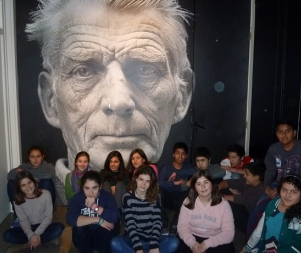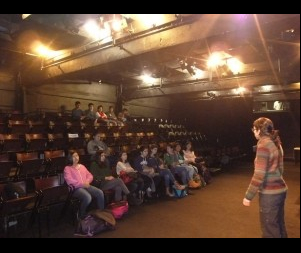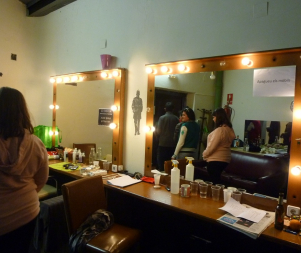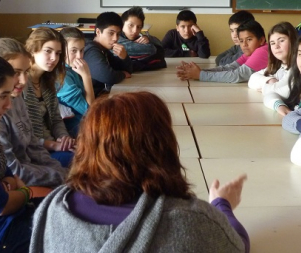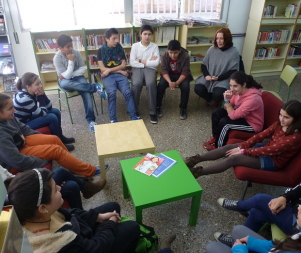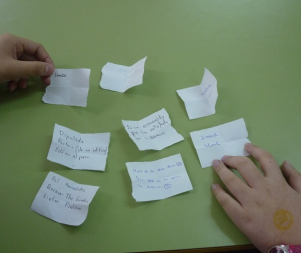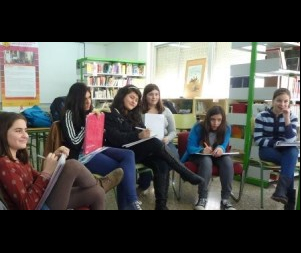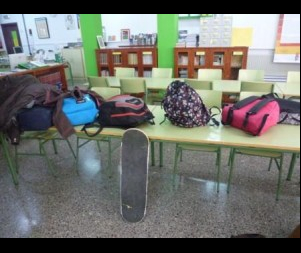- 14th EDITION 2022 / 2023
- 13th EDITION 2021 / 2022
- 12th EDITION 2020 / 2021
- 11th EDITION 2019 / 2020
- 10th EDITION 2018 / 2019
- 9th EDITION 2017 / 2018
- 8th EDITION 2016 / 2017
- 7th EDITION 2015 / 2016
- 6th EDITION 2014 / 2015
- 5th EDITION 2013 / 2014
- 4th EDITION 2012 / 2013
- 3rd EDITION 2011 / 2012
- 2nd EDITION 2010 / 2011
- 1st EDITION 2009 / 2010
Cristina Clemente IN RESiDENCE at the School Príncep de Girona
The first transformation of the theatre at the school
The ancients thought that the theatre transformed you. Today, this idea infuses all theatrical experiences. When someone takes their seat in the theatre, they secretly hope that, when they stand up again, they will be been turned into a different person. It does not always happen, but if only once, it is worth taking this idea into consideration: the theatre transforms. Voices in silence, lights in the dark. And from the first line of dialogue in a play, they become light and voice. I wonder now how we (a group of pupils at Institut Príncep de Girona and their teacher) must have been changed by their work over the last academic year with the playwright Cristina Clemente, developing their In Residence project.
The first transformation produced by the theatre at the school was to change the mood during the final hour on a Friday. At one o’clock in the afternoon, while the pupils repeated “Still another hour to go!”, we, the theatre group, called out, “Oh, good, at last, our two hours of theatre”. Because they were two hours. The second, with the school empty by now, outside the timetable of the other pupils in the second year of ESO secondary education. The theatre, as usual, continued to change everything around. At first, in the classroom, which soon proved to be too small; and later, in the library, larger and more filled with light. The furniture, abandoning its customer immobility, adapted to the needs of the class: the tables flew, the chairs ran, the walls came in closer or moved further away. One day, six pupils all managed to climb onto a single chair without touching the ground, an exercise that proved highly illuminating for understanding the dynamic of the characters in the play.
As the teacher involved in the activity, I was able to note that the project had turned the straight railway lines of subject planning into a hot-air balloon at the mercy of the winds. Each class served to set the course of the next. And the sequence was not dictated from outside, by a list of goals to be achieved, but from within the activity itself. What they did next was no more than what was required by what they had done before. Each session invented the next. It was impossible to predict what we would do in three weeks’ time, but looking back you realised that it was all surprisingly consistent.
At the press conference that took place on November 14 to present Cristina Clemente’s play Consell Familiar [Family Council], the work that we had watch as it grew over the course of a year, and about which we knew, not only the characters and themes, but also some of the technical secrets behind it and even some of the doubts and worries that assailed the author, the playwright said that she had written it in order to understand certain things about her own family. This is one of the essential facts about the work: the first thing that a dramatic work transforms is its author. For the metamorphosis that led to the creation of this splendid text probably began on those Friday afternoons during the last hour of class time, in the library at Institut Príncep de Girona, when a group of pupils began to be themselves thanks to contact with the theatre. Because, it is true: the theatre transforms us into ourselves. Just as the ancients foresaw.
http://bloc.edubcn.cat/2013/11/en-residencia-amb-cristina-clemente-a-l%E2%80%99institut/
José Ángel Cilleruelo
Institut Príncep de Girona

